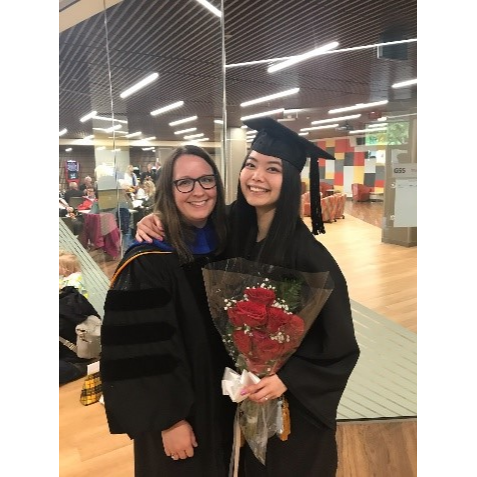Rachel Beall, an Economics, and Theatre and Dance double major, graduated from The College of Wooster in 2019. She is now employed at an executive search firm in Cleveland where she is in a rotational program. So far Rachel has worked in content, search and strategy, and is in the process of finishing her last rotation in data.

In her senior year, Beall submitted two Independent Study projects – based on her double major. She successfully and uniquely incorporated both Economics, and Theatre and Dance topics in each. Rachel believes her majors came together to allow her to choreograph two dance pieces which were essential for her I.S. data collection. Her advice to double majors is that although some disciplines may seem unrelated, they can in actuality complement one another.
“Coming up with connections for I.S. may take an extra step, especially if the two fields seem like opposites. This can also have benefits: in my case, because Economics and Dance are so different, there was a gap in the literature which fit my research well.”
Rachel Beall’19
For her Theatre and Dance I.S., Beall intertwined Econometric concepts and Dance choreography! However, even more notable than this was her accomplishment in publishing her Economics I.S., co-authored by Dr. Brooke Krause – her I.S. advisor. This research paper, titled ‘Preferences for Perceived Attractiveness in Modern Dance’, focused on finding a relationship between the audience’s willingness to pay and their perceptions of the dancers’ attractiveness. The article was published in the Journal of Cultural Economics in June 2021. We asked Rachel how it feels to have her I.S. published to which she responded, “It feels quite amazing. Having read many peer-reviewed articles during the research process, it’s almost surreal to think that my I.S. has also made it through the peer-review process.”
While studying Economics of Gender and discussing various forms of discriminations that influence market outcomes, Rachel realized consumer discrimination was less talked about. “I was also thinking about my Theatre and Dance major and started looking for research combining the arts, consumer preferences, and consumer discrimination. Not seeing an overlap across these topics, I decided to start my journey in investigating new questions.”
Beall stated that her I.S. process motivated her to take on challenges. She fondly mentioned how Dr. Krause guided her in a way to encourage her own conclusions, “because of this, I feel a greater ownership of my I.S.” Upon asking Dr. Krause how her experience was advising Rachel, she described it as a rewarding process because she was able to see how Beall brought together the concepts and skills she learned through her coursework. Dr. Krause recalled, “I intentionally had a very hands-off approach as her I.S. advisor because I knew she had this passion for combining the themes from her two majors, Economics and Dance, and the skillset to make it all come together. I appreciated how she used our I.S. meetings well by coming prepared with a list (sometimes a very, very long list) of questions and ideas to discuss together.”
Rachel reflected that publishing the research article was a huge learning experience. “Although I wasn’t sure what to expect, Dr. Krause was an exceptional resource and role model. She was a joy to collaborate with because she was open-minded, patient, and valued my input. Throughout most of the process, we were working remotely. It was truly a long-waited and awesome moment when we finally got together in person to celebrate our work when our paper was accepted into the journal!”
Dr. Krause described the publishing process as: “When we transitioned from her I.S. to turning it into a peer-reviewed publication, the first thing we did was a baton-transfer of sorts where I took her I.S. and for the first time made direct edits and wrote. I could re-format the components of it that we would use in the article and then wrote some of the pieces that we would need to add to match the article styles within the field of Economics. After this first pass on the document, we worked really well together in alternating edits, leaving comments for one another, and talking through ideas, literature, results, and ways to present the story for the article. We went through several rounds of edits from anonymous peer-review referees and then had comments to address from the editors themselves. Rachel felt very much like a peer collaborator in this sense – she was able to really understand the comments and what the editors were suggesting and had great ideas on how to integrate those ideas into the article. We would frequently pass a draft of the paper back and forth to each other, sometimes even multiple versions within the same day, and we had conversations at critical junctures where it made sense to talk through things together. Rachel’s strong communication skills, her kindness and flexibility, and her strong work ethic all made her an ideal co-author!”
Beall’s advice for students who are interested in following a similar path as hers and publishing their I.S. research is to find a source of strong mentorship. “Working with someone who knows the process of editing, submitting, and going through the peer-review process (as well as some of the pitfalls), is invaluable.”